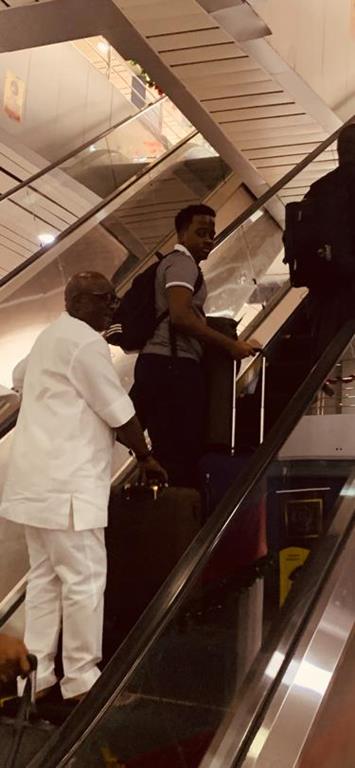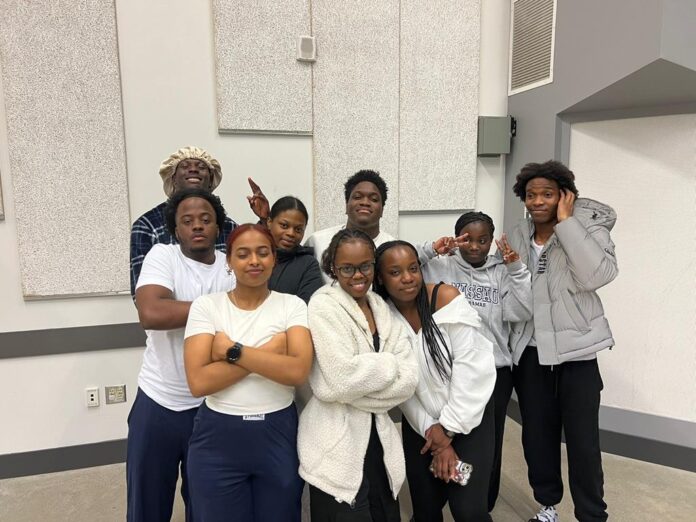As an 18-year-old boy from the shores of Nigeria and the heartland of Ontario, I have experienced a great deal of change and adaptation. That being said, moving to Abbotsford and going through such a change alone was a whole new arena: a new province; a new city. No one was going to help me unpack bags like my mother did when I first landed in Toronto a couple years ago. It dawned on me that I was no longer a child, but in fact a young man on a long journey toward independence and self-reliance. I also realized the task of finding the coolest hang out spots in the block, like my siblings did when we first arrived, now fell to me as well. This time, adjusting to a new environment was all on me; I expect the thousands of international students at UFV might feel the exact same way.
There’s a lot of cultural similarities between Nigeria and Toronto — within minutes of landing in the city, you smell a pot of jollof rice and hear the sound of afrobeats just a street or two from the airport. This rich, proud presence of African influence is quite visible when a foreigner arrives; this is what quickly attracted my mother to the city and encouraged her to embrace a potential new home. My African roots were not in danger of being lost or displaced when we moved to Toronto, for there had always been a significant presence of the minority community in the city. I could have been naive in assuming this would be the case for all other cities in Canada, but upon my arrival to Abbotsford, it didn’t seem to be the case. I don’t believe I had done enough research on minority representation in this part of the country, which is ironic considering it would be the place I’d reside for the next four years. It didn’t occur to me to conduct such research, as the trends in other parts of the country indicate growing diversity.
It is safe to say my shock at the societal differences between cities like Toronto and Abbotsford was truly overwhelming. For instance, there are currently no African restaurants in Abbotsford, and hardly any African grocery stores that sell exclusively African products. This is because the market for such a consumer demographic is nearly non-existent compared to other parts of B.C. On my arrival here, the first African-made dish I had was in Surrey, and another one in Vancouver, which has a considerable African community. Living in Toronto, it felt like there was hardly a street without an African presence on it, be it a grocery store, a restaurant, or even a small community church; this made me consider the city home, whereas in Abbotsford I really began to feel like I was abroad.
Getting into UFV was an honour for me. After applying to 15 Canadian universities, two American, and one British, I was accepted into all of them, even receiving scholarships for some, including UFV. Like many international students, the most appealing universities are the cheaper ones, which nevertheless offer quality teaching. Maturing and gaining a newfound independence made me acknowledge this reality, and eventually embrace it. UFV was the most affordable option for me and many others, and in that I presumed the school would be bursting with a lively international community, subsequently adding a diverse cultural dynamic to the town itself. This made me look forward to the move, and although knowing this next step of my academic life would be by myself, the hopes of retaining an African community presence somewhat eased my concerns.
However, upon arrival, this wasn’t the case. It is important to note that on UFV’s website it says the university is situated on the outskirts of Vancouver; it would be a lie to claim the city’s reputation of diversity and nightlife is not well known back home. However, I didn’t research the actual location of the university itself. Upon my arrival, I gave myself a couple weeks to settle in and feel the vibe of the city – which is more accurately a town – before deciding whether I liked it. In Toronto, the winter season doesn’t hinder any recreational events, but it is understandable that the average person would prefer to stay home during this season. Days, weeks, and eventually months, passed by without a single cultural or minority-oriented event that I was aware of. No denying at that point that Abbotsford would take a lot of effort to get used to.
Although I acknowledged that the Afro-Caribbean community was not as lively or present compared to its neighbouring cities, and certainly my home, I chose not to make any assumptions about the school in relation to its city. While I remained optimistic that perhaps there was a Black Student Union (BSU) that was as large and active as any other surrounding universities, this turned out not to be the case. In my first semester, I could count how many Black students I saw in the entire school with just one hand. While interacting with as many as I could, I came to realize that we all had this collective urge to see a larger community for our people, and indeed a representation in the school’s leadership. I remained hopeful during the course of the semester that I may come across more Afro-Caribbeans, and indeed I did.

In my second semester of my first year, I attended an economics class when a North African student and I decided to start publicly advocating for the establishment of a (BSU) here at UFV. We labelled this association the Afro-Caribbean Society (ACS), a recognition of the Afro and Caribbean cultural connection and a uniting of the regions. Although miles away from each other on the globe, the ACS aimed to bridge the gap between Africans and Caribbeans and celebrate the similar culture and traditions we share. We had hoped that the university leadership, or more specifically the Student Union Society (SUS) would hastily support the creation of our club and give us a legitimate platform among other clubs. However, our efforts were only rewarded after a dreadfully long period of time: six months.
Mountains of documents were sent to us. We quickly filled them out and sent them back, but still we waited for our formal establishment. That didn’t deter or discourage us from our goal, however. We kept reaching out to as many Black students as we could find, and even took to social media to appeal to Africans and Caribbeans in the UFV community that there is indeed a space for them to feel at home on campus. Above everything else, our goal for the club was the comfort and reassurance of our community that they were not alone, both new and old students — including our leadership. We know just how large of a hole a lack of diversity and culture can cause for minorities. The endless reminiscing, home-seeking, and validation all effectively lead us to feel incomplete. Our objective was to erase these feelings and replace them with the feeling of belonging.
Before getting into university, I couldn’t hide my excitement for meeting new people and entering a new stage in life. The sad part was acknowledging that we would be going our separate ways and leaving our customs and cultural practices where we lived. But we held the belief that a silver lining would be a similar presence of the customs and practices wherever we land, no matter how big the community ended up being. When I arrived in Abbotsford, I didn’t expect that presence to be as small as it was at UFV. But two years in, I am proud to have established the African Caribbean Society with people I met here and consider my family. “It is certainly about time we ushered in a club dedicated to providing a safe space and fun time for our people,” current Vice President of Events Chris Adeshina cheerfully remarked.
I can never forget the smiles on everyone’s faces when we first got together for our meet-and-greet. This first meeting was filled with activities that initiated conversations intended to familiarize our community, and games that inspired teamwork and collaboration, highlighting the importance of counting on each other. By grouping ourselves, we also made it easier for everyone’s voices to be heard and fortunately some of the relationships fostered from our first meet-and-greet still remain as friend groups to this day. Akondu Jumbo, a member of the ACS stated that “it was a proud moment to be an African here at UFV, and seeing many fellow minority students gave me a lot of comfort.” The planning phase leading up to the event did however take a toll on the executives, as Daniel Wakama, the vice president (VP) of events at that time stated how “difficult it was at first to pick out the games that would interest all members and ensure their willing participation. Hours spent on TikTok researching challenges did greatly pay off.” Barely an hour in, the atmosphere resembled a family reunion or Thanksgiving, rather than a first-time meeting — thankfully everyone seemed to get along right away. Now, it warms my heart to see a growing number of UFV students from all parts of the world that share in a rich African and Caribbean heritage.
Moving forward, it will be the ACS’s goal to advocate for more funding from the school in order to adequately accommodate the ever-growing number of Black students, as well as organize more events for the community. It is my hope that we succeed in these ways and are able to establish ourselves as UFV’s BSU permanently. Our growth will take collective effort: not just from our demographic, but from allies and other racialized students in our school. Through a united campaign, our student engagement can be on par with what is offered at the institutional level at universities like UBC and SFU. Through this, we could bring a greater reputation to UFV, most importantly to the diversity and culture of our university. I look forward to the semester, and I am certain there are even better days ahead for the ACS.


